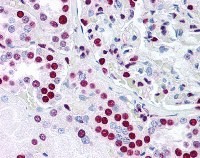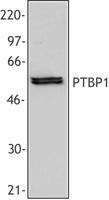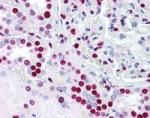- Clone
- 3H7 (See other available formats)
- Regulatory Status
- RUO
- Other Names
- Polypyrimidine tract binding protein 1, Heterogeneous nuclear ribonucleoprotein I, hnRNP I, 57 kD RNA-binding protein PPTB-1, PTB
- Isotype
- Mouse IgG1, κ
- Ave. Rating
- Submit a Review
- Product Citations
- publications

-

Formalin-fixed paraffin-embedded human kidney tissue was stained with 3H7 at 15 µg/ml and developed with an alkaline phosphatase chromogen substrate (red color). Tissue was counterstained with H&E (blue/pink). Magnification, 40X. -

Extracts from human PBMC were resolved by electrophoresis, transferred to nitrocellulose, and probed with monoclonal antibody against PTBP1 (clone 3H7). Proteins were visualized using a goat anti-mouse secondary conjugated to HRP and a chemiluminescence detection system.
The 3H7 monoclonal antibody recognizes human PTBP1 also known as Polypyrimidine tract binding protein 1, Heterogeneous nuclear ribonucleoprotein I, and 57 kD RNA-binding protein. PTBP1 is a ubiquitously expressed nuclear protein with a predicted molecular weight approximately 59.6 kD. The polypyrimidine tract binding protein (PTB) is an important regulator of alternative splicing that also affects mRNA localization, stabilization, polyadenylation, and translation. PTBP1 has been shown to interact with FUS, Caspase3, PKCa, Raver1, and HnRNP-L protein. The PTB gene contains 15 exons and spans 13.5 kb. The 3H7 antibody has been shown to be useful for Western blotting.
Product DetailsProduct Details
- Verified Reactivity
- Human
- Antibody Type
- Monoclonal
- Host Species
- Mouse
- Immunogen
- Recombinant human PTBP1 (full length)
- Formulation
- Phosphate-buffered solution, pH 7.2, containing 0.09% sodium azide.
- Preparation
- The antibody was purified by affinity chromatography.
- Concentration
- 0.5 mg/ml
- Storage & Handling
- The antibody solution should be stored undiluted between 2°C and 8°C.
- Application
-
WB - Quality tested
IHC - Verified - Recommended Usage
-
Each lot of this antibody is quality control tested by Western blotting. Western blotting, suggested working dilution(s): Use 10 µl per 5ml antibody dilution buffer for each mini-gel. For IHC, use a 15 µg/ml dilution of antibody for staining. Antigen retrieval for IHC of formalin-fixed paraffin-embedded tissue using 0.01 M sodium citrate buffer is recommended. It is recommended that the reagent be titrated for optimal performance for each application.
-
Application References
(PubMed link indicates BioLegend citation) -
- Gabai VL, et al. 2012. Moll Cell Biol. 32:929. PubMed.
- Product Citations
-
- RRID
-
AB_2171285 (BioLegend Cat. No. 630101)
Antigen Details
- Structure
- PTBP1 belongs to the subfamily of ubiquitously expressed heterogeneous nuclear ribonucleoproteins (hnRNPs). PTBP1 contains four RNA recognition motifs (RRMs). Nuclear protein, predicted molecular weight approximately 59.6 kD
- Distribution
- Nucleus, ubiquitously expressed
- Function
- Plays a role in pre-mRNA splicing. Binds to the polypyrimidine tract of introns. May promote the binding of U2 snRNP to pre-mRNA. Cooperates with RAVER1 to modulate switching between mutually exclusive exons during maturation of the TPM1 pre-mRNA.
- Interaction
- FUS, Caspase3, PKCa, Raver1, and HnRNP-L
- Biology Area
- Cell Biology, Transcription Factors
- Molecular Family
- Nuclear Markers
- Antigen References
-
1. GilA, et al. 1991. Genes Dev. 5 (7):1224.
2. Ghetti A, et al. 1992. Acids Res. 20:3671.
3. Romanelli MG, et al. 2000. Gene 255:267. - Gene ID
- 5725 View all products for this Gene ID
- UniProt
- View information about PTBP1 on UniProt.org
Related Pages & Pathways
Pages
Related FAQs
Other Formats
View All PTBP1 Reagents Request Custom Conjugation| Description | Clone | Applications |
|---|---|---|
| Purified anti-PTBP1 | 3H7 | WB,IHC |
Compare Data Across All Formats
This data display is provided for general comparisons between formats.
Your actual data may vary due to variations in samples, target cells, instruments and their settings, staining conditions, and other factors.
If you need assistance with selecting the best format contact our expert technical support team.









Follow Us